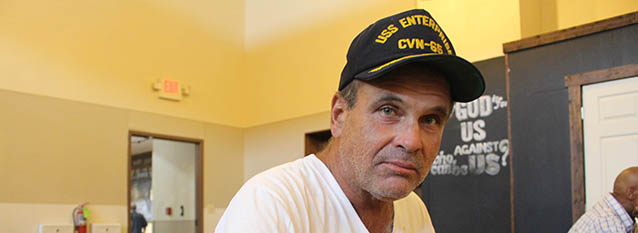
Homelessness and Veterans
This Fourth of July, families across the country will gather to celebrate America’s Independence. Burgers will hit the grill. Fireworks will light up the sky. Joey Chestnut will attempt to eat his weight in hot dogs. And red, white and blue will be the colors of the day.
But this day is about more than backyard barbeques and spectacular firework shows. The brave men and women of our military have fought to make sure that the freedom that was dreamed of by our forefathers in 1776 remains intact today and for generations to come. So, what happens when our veterans fall on hard times and need a helping hand? At the Mission, we pull our resources together to serve those who have honorably served our country.
The words homeless and veteran together bring a range of emotions and images. According to the US Department and Housing and Urban Development (HUD), on any given day, an estimated 40,056 veterans are experiencing homelessness. Of that 40,056, two-thirds are staying in shelters or programs like the Mission’s Life Recovery Program.
The majority of the veteran homeless population consists of men that are over the age of 51. Our military has adapted over the years and is providing our younger service men and women with mental health care and access to more resources. Unfortunately, 62% of the homeless veteran population did not receive those same services. According to The Military Wallet, 62% of homeless veterans served in the Vietnam War and or have served prior to the Vietnam War. In comparison, only 5.5% of homeless veterans served in Iraq or Afghanistan.
So, what are some of the most common reasons veterans may experience homelessness?
- Post-Traumatic Stress Disorder (PTSD). Trauma from war zones can often lead to flashbacks and will trigger a person’s flight or fight response. According to the VA, it’s estimated that about 30% of Vietnam Veterans have had PTSD in their lifetime. Left undealt with, this condition can be debilitating.
- Disabilities and Chronic Health Conditions.
- Substance Abuse. This is a common coping mechanism when it comes to dealing to trauma.
- Unable to navigate available resources. In the military, everything happens under one roof at one base. However, when veterans transition in civilian life, they must learn to navigate a new complex system of resources.
- Depression or other Mental Illness. Veterans often report missing the camaraderie that the military provides and many lack emotional support.
- Predisposition to instability. Many service men and women joined our military not just to serve their county but also as a way out of chronic poverty. If a person is never able to cope with past trauma, those issues will come to the surface at some point during their lifetime.
That’s a lot of numbers and a lot of facts but I’m not here to leave you hanging! Here is how the Shreveport-Bossier Rescue Mission is making a difference in the lives of our homeless vets.
The Mission is on the front lines when it comes to helping the hurting and homeless in our community. We serve guests from all walks of life that are dealing with various struggles and obstacles. Everyone that comes into the Mission is needing help but the veterans that come to the Mission require unique care and services from our Life Recovery Program.
So, what can we as a community do to help our homeless veterans?
First, pray daily for our homeless veterans that are at the Mission and ones that have not found their way to the Mission yet. Pray for hope, healing and restoration.
Second, send any veteran that is experiencing homelessness or on the fringe of homelessness to the Mission. Recently, the Mission helped Air Force veteran William find housing at our TLC Campus and helped US Navy veteran Tim find a job and housing. If there is a veteran in need, we are here to help.
Third, support the Mission and the work that we do with your time, talent and resources. The Mission has successfully helped many veterans overcome their struggles and given them the tools they need to be productive members of our community. This process is tedious and requires more than just housing. Psychology Today reports on a study of formerly homeless veterans which “found that 44% experience at least one day of homelessness within five years after being successfully placed in housing and that drug use and post-traumatic stress were the strongest predictors of later homelessness.” At the Mission, we know that if we do not get to the root cause of someone’s homelessness, we will never truly eliminate the problem. Our Life Recovery Program addresses the root cause of someone’s homelessness and gives them practical tools to sustain long-term employment and housing.
Finally, share with your friends, family and church about what the Mission is doing to care for homeless veterans in our community. The best way we can reach someone in need is through passionate people sharing what God is doing at the Mission.
President John F. Kennedy once said, “As we express our gratitude, we must never forget that the highest appreciation is not to utter words but to live by them.” You can make a difference for homeless veterans in our community. Join the #SBMissionLife by volunteering, donating goods or donating funds to the Mission and together, we can show our veterans how much we care not just for one holiday but all year round.
Pastor Larry Otwell, Executive Director







